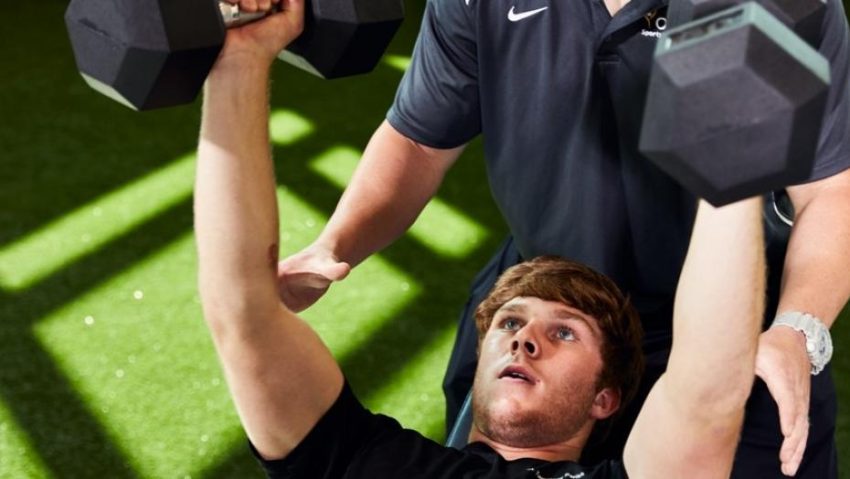You can train fanatically or only go to the gym twice a week. In any case, when playing sports, we all want to get the most out of training, whether it is the desire to become stronger, leaner, or look good.
Success in sports requires certain skills, and developing those skills requires patience and determination. However, there are other things to consider if you want to increase the efficiency of your training process. Think about it; you may not get the most out of your workouts.
Sports performance is a complex combination of biomechanical functions, emotional factors, and training methods. Performance improvement is how athletes prepare themselves—physically and mentally—for optimal performance in their chosen sport. And they are tied to innate abilities, physical and mental health, training program, and much more.
To enhance the effect of training, you need to adequately dose the load, fully recover and use specialized Applied Nutrition Pump supplement made from natural ingredients and capable of providing a wide range of benefits to improve athletic performance and the condition in general. But first things first.
Sports supplements to improve the effectiveness of training
1. Creatine Monohydrate
Surely you have heard that creatine is one of the most effective performance-enhancing supplements in terms of increased high-intensity performance, muscle mass, strength, and body composition. And all this is true.
Creatine supplementation works by increasing muscle stores of phosphocreatine, which promotes faster regeneration of adenosine triphosphate (ATP), the body’s main energy source.
Studies have shown that creatine supplementation is effective for strength training and increasing muscle endurance in sports such as football, hockey, rugby, and basketball.
2. Caffeine
Do you want to run a faster distance or improve the accuracy of passes on the football field? Caffeine will help you do this, as it improves your mood, increases your pain threshold, and allows you to mobilize fat stores by using fat as your primary fuel source. But that’s not all. Most of us use caffeine for its ability to increase focus, but this versatile stimulant can also increase performance and stimulate the release of endorphins during exercise.
Whether you prefer to spend your weekends on the football field or try to set records in the gym, current research confirms that caffeine will be beneficial in any sport where high-intensity interval exercise is involved.
3. Beta-alanine
Beta-alanine is an amino acid essential for the formation of carnosine, a dipeptide found in skeletal muscle that is needed to neutralize the lactic acid that builds up after heavy muscle work and causes the pH to drop, eventually leading to fatigue and pain.
Supplementation with beta-alanine will help avoid metabolite accumulation in the muscles, prevent acidification of the environment during intense exercise, and increase training effectiveness. It is necessary to take them both on training days and during periods of rest with the obligatory observance of the recommended dosages since their excess, although not dangerous to health, can reduce the rate of muscle building or weight loss.
4. Protein
Physical activity puts stress on your body, and this stress increases the longer, harder, or more often you exercise. Thus, the more intense and exhausting the training program, the more important the role of recovery, for which protein is simply necessary.
It is worth remembering that protein is rarely used as an energy substrate (i.e., fuel) during short-term activities such as weight training in the gym, basketball games, or sprint races. However, it is necessary to recover, construct, and maintain muscle mass. Taking protein after a hard workout will not only increase the rate of protein synthesis and stimulate muscle growth but also help you become stronger and more resilient.
5. Omega-3 fatty acids
Omega-3 fatty acids help improve athletic performance and play a key role in recovery. EPA and DHA, two of their essential fatty acids, help support a healthy post-workout inflammatory response. This, in turn, helps reduce muscle soreness, which is often felt for hours or days after strenuous or unaccustomed exercise.
Omega-3s are also critical for building and maintaining muscle. The supplement helps you recover faster and train harder.
Remember to replenish the deficiencies of vitamins and minerals, which also greatly impact the effectiveness and efficiency of training. For example, B vitamins speed up metabolism, while calcium and vitamin D help maintain muscle mass and reduce the risk of physical injury.
Other Ways to Improve Your Workout Performance
Tip 1. Moisturize
Proper hydration is one of the easiest ways to improve your athletic performance and energy levels. This simple action should be a top priority, whether training on the field under the sun or working under the air conditioning in the gym.
During training, the body loses up to 3-4 liters of fluid through sweat every hour, greatly reducing functionality and concentration. That is why water should always be at your fingertips. Proper hydration maximizes circulation, promotes joint mobility, helps regulate body temperature, and fights the effects of dehydration!
It is important to drink before, during, and after training. Experts recommend drinking a glass of water 20-30 minutes before training and 200 ml every 10-20 minutes during it. And remember to replenish your fluids after a workout by drinking a glass of water or an isotonic drink about 30 minutes after your workout.
Tip 2. Don’t neglect recovery
Like hydration, recovery is another important aspect of performance improvement that is often overlooked.
The muscle takes 24 to 48 hours to recover and rebuild. Loading a muscle before it has had enough time to recover can cause tissue to break down instead of building muscle mass. Any experienced weightlifter will tell you that you can’t train the same muscle groups two days in a row.
Resting your major muscle groups for a day or two after your workout is the easiest way to speed up recovery. But other ways can be used as a supplement, such as physical therapy, stretching, and massage.
Some experts also consider it necessary to practice active recovery on rest days, i.e., engage in feasible and enjoyable activity when you do not have training. This could be walking, cycling, playing table tennis, or even physical housework. This approach is believed to speed up blood circulation and transport of nutrients to the muscles and reduce their delayed soreness.
Tip 3. Proper sleep
Another common but very important tip: get enough sleep! Sleep speeds up recovery and gives muscle tissues and the heart time to rest. Sleep also helps to store and form memories, which is great for athletes who need to pay special attention to specific actions, exercises, and movements.
And, of course, sleep helps build muscle mass since it is during sleep that the growth hormone level rises and the amount of cortisol that destroys muscle tissue decreases. At the same time, microdamage that was inflicted on the body during training is healed.
Try to sleep 6 to 9 hours a night in a dark, quiet, and cool room. Give up gadgets and spend time before bed in the most relaxed and calm environment.
Tip 4. Complex exercises
Instead of isolating your muscles with exercises like bicep curls, you can simultaneously minimize your time exercising by doing exercises that work for multiple muscle groups. Thus, with just a few exercises, you can give a load to the whole body.
Another advantage of such exercises is that when they are performed, the muscles work together, as in the real world, and not one by one.
Examples of effective complex exercises: are squats, deadlifts, lunges, push-ups, bench presses, military presses, pull-ups, dips, and more.
Tip 5: Change or adjust your workout routine every 3-4 weeks
Sticking to the same workouts repeatedly will make it hard to achieve impressive results. At some point, you will notice that sports progress has stopped. It’s important to avoid this. Changing the training program every 3-4 weeks will positively affect training effectiveness, muscle memory, strength, and power development.
At the same time, you can change weights, working with ever heavier weights and any other quantitative parameters. You can vary the number of exercises per workout, change the frequency of sets and repetitions, and even use different training principles if they suit your goals and help you achieve results.
Tip 6: Take care of your mental health
Dealing with stress, anxiety, and depression can be challenging. And while no one is immune from psychological stress, it is important to remember that such a state can affect your sleep, concentration, stamina, and energy levels. The ability to manage and prevent stress is an important skill that anyone who wants to increase training effectiveness and achieve high results should master.
There are many ways by which you can quickly improve athletic performance. However, eating healthy, drinking enough water, getting enough sleep, taking the right supplements, changing your workout routine, and taking care of your mental health are the first steps to achieving optimal performance!

